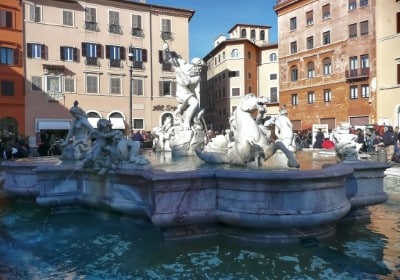Are you looking to retire in Italy? Good choice! Italy is one of the top places to retire in the EU, offering sensational history and culture, mouthwatering cuisine, and some of the top expat retiree communities.
In this article you’ll learn about:
- Why you should retire in Italy
- How to retire in Italy
- The best places to retire in Italy and much more
How to Retire in Italy
Italian Elective Residence Visa
To retire in Italy as a non-EU citizen, you’ll need a long-term visa. The most common option is the Italian Elective Residency Visa (ERV). This visa is designed for non-EU citizens who wish to reside in Italy without working. It is particularly suitable for retirees and individuals with sufficient financial means to support themselves without employment. Note that the minimum income requirement is €31,000.
The following is required for the application:
- Complete application form
- One passport-sized color photo (white background, maximum 6 months old)
- A valid passport (Validity of at least three months longer than the visa requested)
- If living in France, a copy of a valid French permit of stay with at least 3 months residual validity
- Copy of the previous French D visa and any other Schengen visa
- Proof of suitable accommodation in Italy (Rental agreement of property ownership)
- Proof of substantial, steady economic resources from private income sources (e.g., pensions, properties, securities, or stable entrepreneurial activities).
- Last 12 months’ pay slips (if applicable)
- Last 12 months’ personal bank account statements
- Last 12 months’ credit card statements
- Private medical insurance (Minimum €30,000 coverage)
The temporary residence permit granted through the Elective Residence Visa allows you to stay in Italy temporarily. Fortunately, after five years, you can apply for permanent residency. This also opens the door to acquiring Italian citizenship and making it your new home country after ten years.
Italian Golden Visa
Launched in 2017 by the Italian government to encourage foreign direct investment, the Italy Golden Visa, also called the ‘Investor Visa for Italy,’ allows third-country nationals (non-EU/EEA and non-Swiss) to obtain a residence permit in exchange for an investment in the country’s economy.
Italy’s Golden Visa also provides you with access to a special tax incentive that allows golden visa holders to pay reduced income tax after becoming an Italian tax resident. The minimum investment amount is €250,000 in government bonds, corporate shares, innovative startups, or philanthropic donations, and the investor residence permit is valid for two years, which can be renewed for three more years. It can also be renewed continuously if the investment is upheld.
Italian Citizenship through Residency
The residence permit allows you to stay in Italy for long periods, but like most European Union countries, non-EU citizens can obtain permanent residency after five years. This also opens the door to acquiring Italian citizenship and making it your new home country.
Requirements for permanent residency
Five years after you retire in Italy, you shouldn’t have a problem knocking off the requirements from the list. To apply for full-time residency, leading to citizenship, you must prove the following to the nearest Italian Consulate or Embassy:
- You must prove that you’ve been residing in Italy for the past four years (EU citizens) or ten years (Non-EU citizens)
- You must present a clean criminal record.
- You must pass an Italian language test proving that you have at least a proficiency level of A2.
- You must still have sufficient income to support yourself or any dependent child.
Healthcare in Italy for Retirees
The Italian healthcare system is well-known for its high quality and accessibility, making it an important consideration for retirees. According to the World Health Organization, Italy boasts some of the best healthcare in Europe.
Retirees in Italy will need to obtain private health insurance to ensure they are covered while living in Italy. However, All Italian citizens and legal residents are entitled to free or low-cost public services through the Servizio Sanitario Nazionale (SSN). So, once you become a resident of Italy, after five years, you are automatically covered by Italy’s National Health Service. While some co-payments may be required for specialty visits and procedures, residents have no deductibles.
Private healthcare in Italy is reasonably priced, with a comprehensive plan from Italian insurers costing around €100 to €300 per month for those over 65. However, retirees are usually exempt from any copayments when they have private health insurance.
Safety in Italy for Retirees
Italy is generally a safe country for retirees, offering a high quality of life and a relatively low crime rate. Violent crime rate in Italy is extremely rare, particularly in rural areas and smaller towns. The main concern in the big cities is pickpocketing, so always keep an eye on your belongings.
The emergency services in Italy are efficient, if you need medical, police, or fire assistance, simply dial 112.
Retiring in Italy Pros and Cons
 Pros of retiring in Italy
Pros of retiring in Italy
Retiring in Italy presents a compelling option for US citizens, thanks to its rich cultural heritage, picturesque landscapes, and favorable living conditions. Let’s take a closer look at why you should consider retiring in Italy:
1. Cost of living
Italy came in seventh place for the best retirement locations in the world and offers an affordable cost of living compared to many parts of the United States, especially in smaller towns and rural areas.
2. Italian lifestyle
The Italian lifestyle, with its emphasis on leisurely meals, social gatherings, and outdoor activities, aligns well with a relaxed retirement pace.
3. Italy weather
Italy’s diverse climates cater to various preferences, from the Mediterranean warmth in the south to the cooler alpine regions in the north.
4. Things to do in Italy
Retirees can immerse themselves in Italy’s abundant historical sites, world-class art, and culinary delights, making everyday life an enriching experience. The country’s well-developed infrastructure, including efficient public transport, also enhances the convenience of living in Italy.
5. Retirement communities in Italy
The welcoming nature of Italian communities makes the transition smoother for retired expatriates.
 Cons of retiring in Italy
Cons of retiring in Italy
1. Bureaucracy
Italy is unfortunately known for having a slow and complex bureaucracy. This can make things like obtaining visas, residency permits, and tax queries time consuming for retirees. However, finding an immigration specialist can streamline the process and make things easier to understand.
2. Language barriers
For English speaking retirees, learning Italian can be a barrier to integrating into Italian culture. It’s important for all expats to learn some of the basics of Italian before immigrating. Luckily, there are new and improved ways of learning to speak Italian, including language apps.
3. Italy tax system
Taxes in Italy are relatively high, and the tax system is quite complicated. However, there are tax breaks for retirees in Italy.
Best Places to Retire in Italy
If you have dreamt of retiring abroad, there is no better place than Italy. The beautiful country is a stunning mix of bustling big cities, amazing food, and rolling hills. It is divided into 20 regions, so there is definitely a corner along the Mediterranean coast that’ll qualify as one of the best places to retire in Italy.
Central Italy
Of all the Italian regions, Lazio is probably the most well-known. It is home to Italy’s capital city Rome, and you’ll find a large expat community there. However, because it’s tremendously popular and packed with luxury shops, it’s generally considered one of the most expensive regions.
Rome and Milan

In Milan, rent and dining out costs are considerably cheaper. For instance, the average monthly rent for a city center apartment is approximately $1,140.44 (€1,022.03) in Rome and around $1,529.76 (€1,370.24) in Milan, both much lower than New York’s average of $4,189.81 (€3,754.78).
Thankfully, other parts of the country are more suitable for a relaxed lifestyle. If sampling local wine and lazing in the sun sounds like a good enough reason to retire to Italy, you’ll love the Abruzzo region.
Charming and friendly, it won’t attract many ex-pats retiring here as it’s a bit off the traditional tourist route. However, it does boast some of the lowest living costs compared to other Italian regions.
Southern Italy

Rich in history and culture, southern Italy (often called the Mezzogiorno) boasts charming towns, delicious cuisine, and welcoming communities.
It comprises several regions, including Campania, Apulia (Puglia), Basilicata, Calabria, Molise, and the islands of Sicily and Sardinia.
Apulia
Also known as Puglia, this southern Italian region is an excellent retirement destination. Its stunning coastline along the Ionian and Adriatic Sea offers retirees access to some of the most beautiful beaches in Italy. The region is dotted with smaller towns, and the countryside is rich in history, offering a relaxed, laid-back lifestyle.
It’s certainly beneficial if you can speak Italian, but the region has attracted many people who can’t over the years. This makes it somewhat easier to integrate with the local community.
However, getting around can be a challenge for retirees as public transportation isn’t as well developed in the region as elsewhere in Italy. That said, the local Apulian people are known for their hospitality and willingness to assist.
How Can Global Citizen Solutions Help You?
Global Citizen Solutions is a boutique migration consultancy firm with years of experience delivering bespoke residence and citizenship by investment solutions for international families. With offices worldwide and an experienced, hands-on team, we have helped hundreds of clients worldwide acquire citizenship, residence visas, or homes while diversifying their portfolios with robust investments.
We guide you from start to finish, taking you beyond your citizenship or residency by investment application.

Frequently Asked Questions about Retiring in Italy
How much money do you need to retire in Italy?
While that largely depends on your living standards, most retired couples can comfortably retire and still enjoy the outdoors for about $2,000 per month.
However, if you look at the income requirements to retire in Italy with the elective residence visa and divide it per month, it works out to about €3,160 – which is more than enough to retire in Italy and contribute to the Italian economy.
Is it difficult to retire in Italy?
That depends on several factors, such as your retirement income, how many retirement years you have left, and where you want to live. Italy is a fairly laid-back country, and there are plenty of things to see and do.
Naturally, it helps a lot if you can speak Italian, but it mainly comes down to how you manage your finances and whether you surround yourself with other foreign retirees. It will only be a matter of time before you call Italy your new home country.
Are retirees subject to paying taxes in Italy?
Whether you are an American or British citizen, anybody who retires in Italy is subject to tax. Expect to pay a seven percent tax on any foreign income, including pensions. In terms of tax incentives, new residents can pay a flat €100,000 annual tax fee on foreign income remitted to Italy for 15 years.
Does Italy allow dual citizenship?
Yes, Italy allows you to hold more than one nationality, and you don’t have to renounce your original citizenship when you acquire an Italian one, provided your home country allows dual citizenship.
What other visas are available for Italy?
As long as you are a non-EU citizen and have a valid passport and the necessary documents, you can apply for an Italy entry visa such as a tourist, business, study, or family reunification visa. The Italy digital Nomad Visa is a great option for those who want to live in Italy while working for their company remotely.
EU citizens don’t need to go through the visa application process, but there are guidelines they must follow to retire in Italy. The elective residence visa doesn’t apply to them as they have automatic freedom of movement.
How to retire in Italy as an American?
If you intend to stay in Italy for more than 90 days within any 180-day period, you’ll need to apply for a long-stay visa. Luckily, Italy provides a visa specifically designed for individuals with substantial passive income, such as retirees; the Elective Residence Visa (residenza elettiva).
Can US citizens retire in Italy?
What is the downside of retiring to Italy?
There aren’t many downsides to retiring in Italy. Some of the top challenges include Italian bureaucracy, language barriers, and the complex Italian tax system.
What are the income requirements to retire in Italy?
The income requirements to retire in Italy with the elective residence visa works out to about €3,160 per month. But this is largely dependent on whether you are retiring alone, have dependents, and your lifestyle.
Who can retire in Italy?
Anyone can retire in Italy. The requirements to retire in Italy vary based on nationality, with different visa options available based on your income or investment interests.



